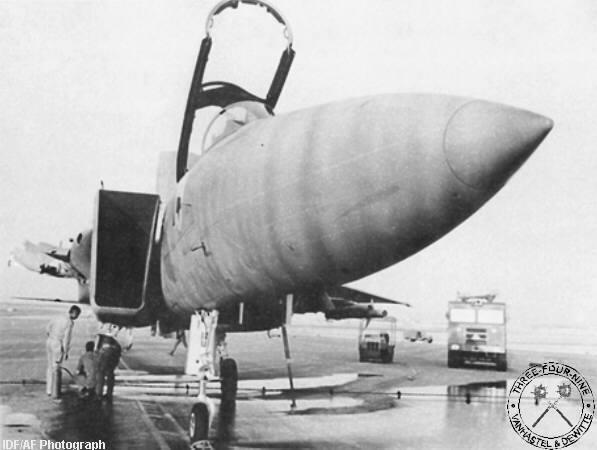CREW'S STORIES
RETURN TO:
NO WING F15
Subject:
F-15
Date:
Thu, 9 Aug 2001 09:01:17 EDT
From:
JEasley198@aol.com
To:
Interesting story andpicture.
Jon Easley
Unbelievable! But DON'T look at the picture until you read the story below! Read the article, then look at the picture.
A simulated dogfight training took place between two F-15D's and four A-4N Skyhawks over the skies of the Negev, Israel. The F-15D #957, (nicknamed 'Markia Shchakim', 5 killmarks) was used for the conversion of a new pilot in the squadron. Here is the description of the event as described in "Pressure suit":
"At some point I collided with one of the Skyhawks, at first I didn't realize it. I felt a big strike, and I thought we passed through the jet stream of one of the other aircraft. Before I could react, I saw the big fire ball created by the explosion of the Skyhawk.
The radio started to deliver calls saying that the Skyhawk pilot has ejected, and I understood that the fireball was the Skyhawk, that exploded, and the pilot was ejected automatically.
There was a tremendous fuel stream going out of my wing, and I understood it was badly damaged. The aircraft flew without control in a strange spiral. I reconnected the electric control to the control surfaces, and slowly gained control of the aircraft until I was straight and level again. It was clear to me that I had to eject. When I gained control I said : "Hey, wait, don't eject yet!" No warning light was on and the navigation computer worked as usual; (I just needed a warning light in my panel to indicate that I missed a wing...)." My instructor pilot ordered me to eject.
The wing is a fuel tank, and the fuel indicator showed 0.000 so I assumed that the jet stream sucked all the fuel out of the other tanks. However, I remembered that the valves operate only in one direction, so that I might have enough fuel to get to the nearest airfield and land. I worked like a machine, wasn't scared and didn't worry. All I knew was as long as the sucker flies, I'm gonna stay inside. I started to decrease the airspeed, but at that point one wing was not enough. So I went into a spin down and to the right. A second before I decided to eject, I pushed the throttle and lit the afterburner. I gained speed and thus got control of the aircraft again.
Next thing I did was lower the arresting hook. A few seconds later I touched the runway at 260 knots, about twice the recommended speed, and called the tower to erect the emergency recovery net. The hook was torn away from the fuselage because of the high speed, but I managed to stop 10 meters before the net. I turned back to shake the hand of my instructor, who had urged me to eject, and then I saw it for the first time - no wing !!!
The IAF (Israeli Air Force) contacted McDonnell Douglas and asked for information about possibility to land an F-15 with one wing. MD replied that this is aerodynamically impossible, as confirmed by computer simulations... Then they received the photo.... After two months the same F-15 got a new wing and returned to action. Special thanks to Tsahi Ben Ami.
This is what "Flight international" wrote about the incident: "The most outstanding Eagle save was by a pilot from a foreign Air Force".
During air combat training his two-seater F-15 was involved in a mid air collision with an A-4 Skyhawk.
The A-4 crashed, and the Eagle lost its right wing from about 2 ft. outboard. After some confusion between the instructor who said eject, and the student who outranked his instructor and said no, the F-15 was landed at it's desert base. Touching down at 290 knots, the hook was dropped for an approach end engagement. This slowed the F-15 to 100 knots, when the hook weak link sheared, and the aircraft was then braked conventionally.
It is said that the student was later demoted for disobeying his instructor, then promoted for saving the aircraft.
McDonnell Douglas attributes the saving of this aircraft to the amount of lift generated by the engine intake/body and "a hell of a good pilot".

RETURN TO: